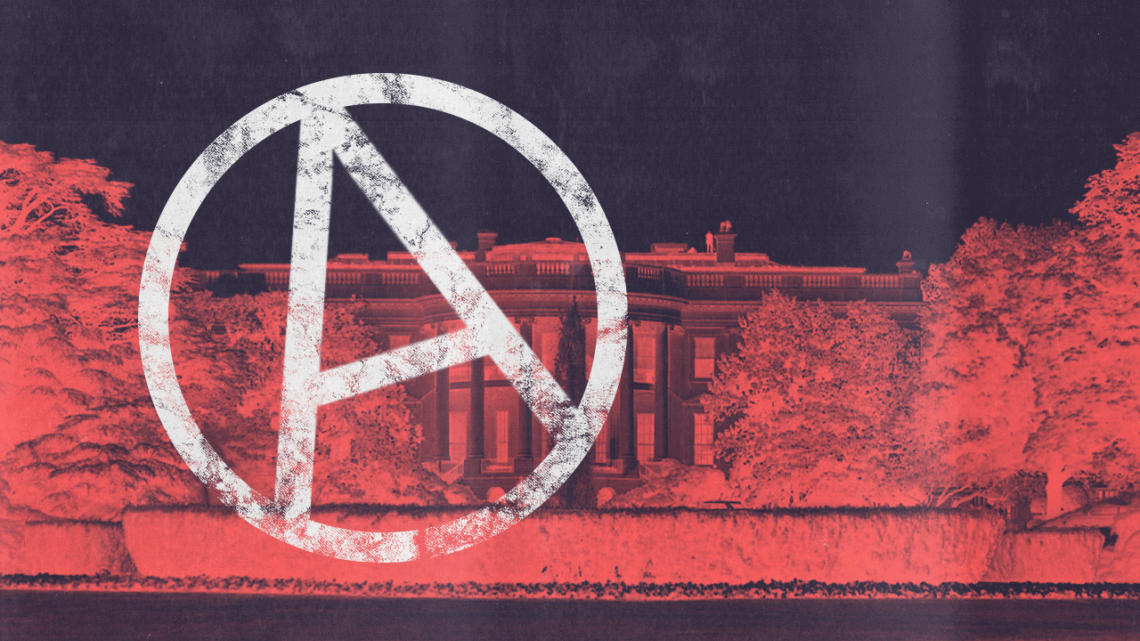The United States is now a battlefield or, as former Defense Secretary Mark Esper calls it, a “battlespace” in need of domination. Linda Tirado, a freelance journalist, permanently lost sight in her left eye after police shot her in the face with a “non-lethal” bullet. Martin Gugino, a 75-year-old man, was needlessly pushed over by police officers in Buffalo, fell backward, and hit his head so hard that blood flowed from his ears. Messiah Young and Taniyah Pilgrim were dragged from their cars and shot with stun guns in Atlanta for the crime of being stuck in traffic after curfew.
Was any of this justified? Our government says it has the right to act to protect its people, but could any of this be called protection? It is impossible to square the sanctimonious self-proclamations of the state to the world we see before us. In Authentic Democracy, released in April, DaN McKee echoes this sentiment by making an argument that state-backed violence is never justified because the state cannot make life better than it could be without government.
To understand McKee’s argument, we must return to the genesis of the contemporary state. Government as we understand it began with ideas first espoused by English philosopher Thomas Hobbes. Having lived through a destructive civil war in 17th century England, Hobbes believed society emerged from what he called the “state of nature,” a pre-state world of perpetual war where all life was “nasty, brutish and short.” Hobbes argued that government (for him, monarchy) emerged from the state of nature as a means to stability. Society was founded and renewed by adherence to an implied contract—hence the name, contractualism—where subjects promised to abide by the king’s rule and the king promised to provide stability through absolute arbitration and forceful imposition, law and order.
This absolute power of government, known as sovereignty, and the duty of the state to maintain its power through force both retain their relevance today—even in ostensibly “democratic” societies. It is impossible to understand any notion of state-based society without sovereignty, and almost every political philosopher since has traded in the currency Hobbes originally struck. From John Locke to John Rawls, the philosophers of the western tradition have decidedly come out in favor of the necessity of the state and its absolute power.
For those of us who believe a better world is possible, this might seem a bleak diagnosis. But just as Locke laid the groundwork for representative democracy by defending a more aristocratic monarchy, so too could contemporary philosophers, like Rawls, lay the groundwork for something better. We only need someone, like McKee, to recontextualize the arguments already provided. In Authentic Democracy, McKee does this by examining a simple, seemingly trivial premise already present in all strains of contractualism: The state can only justify its existence by making things better for people. But what does “better” mean?
For Hobbes, a better life included guaranteed protection from indiscriminate murder. Locke expanded upon Hobbes’ “right of nature,” a precursor of our right to life, by adding a right to liberty and a right to enjoy the fruits of one’s labor (which we might still be able to divorce from his idea of a right to property). Rawls prioritized the need for any government to strive to create a society where a better life was defined by its access to fairness, which might be more readily understood as equality and opportunity. McKee accepts the importance of all of these, some with more qualification than others, but for him they exist only as general tendencies or, as he calls them, “species-interests.”
Using a variation of Rawls’ original position, a thought experiment that asks people to choose the ideal society without knowing where they would end up in said society, we can posit that every person should want to choose a society where species-interests are maximized while restrictions to personal autonomy and equality remain minimized. (Game theorists will recognize this as the maximin strategy.) If this is true, then only pluralist democracies, including liberal representative democracies and anarchist societies, could make things better for people by maximizing our species-interests without taking away our self-sovereignty.
“Beneath all claims to democracy,” McKee writes, “is found the same underlying idea: as ultimately people are understood to be self-sovereign and rationally autonomous individuals, and this self-sovereignty is seen as the only truly legitimate form of political power that there is, the authentic democratic idea is to ensure, as much as is possible, that the people in any given society govern themselves.” And this is the problem with our present society, the people do not govern themselves. Instead, we are met with violent force for merely suggesting our government comply with our will, and we are forced to abide by decisions that are not our own.
We might think the failure of the state to uphold its end of the contractual bargain is due to its inability to guarantee equality or to protect its citizens against police brutality, and while these are indeed serious problems, they are only symptomatic of the real difficulty. The root of the failure of the state is in its inability to allow any authentic autonomy at all, economic or political. The state encourages police officers to beat those they claim to protect precisely because self-sovereignty is a direct threat to state-sovereignty. Only a truly authentic democracy, a society where the state is replaced by a multitude of equal voices with full autonomy, can make life better for everyone. The only society that would allow such autonomy while also meeting the rest of our species-interests, McKee rightfully notes, is an anarchist one.

